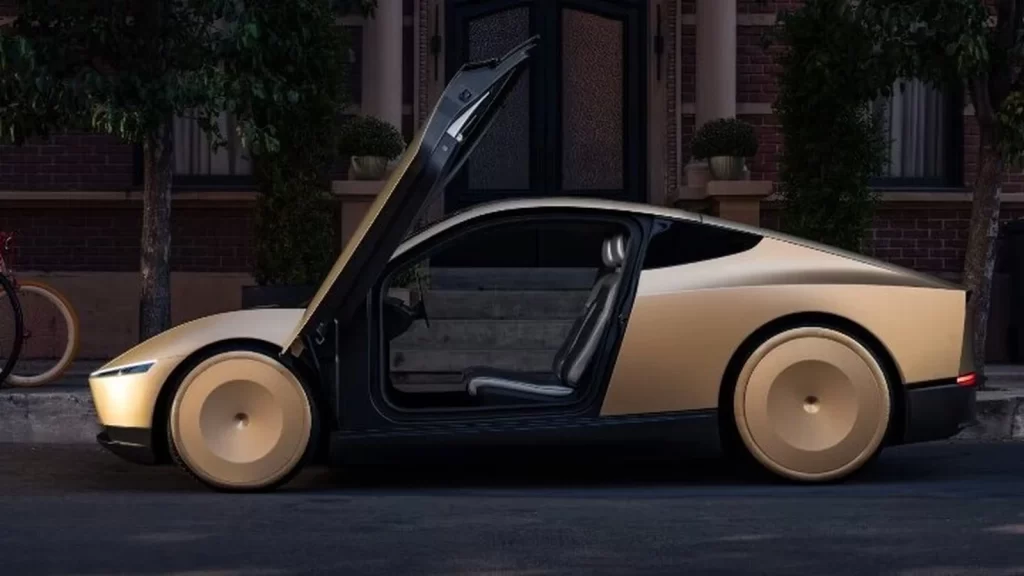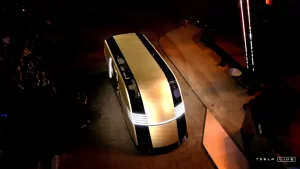Elon Musk Introduces the Cybercab at Tesla’s Robotaxi Launch Event
3 min read

Elon Musk, the CEO of Tesla, recently introduced the highly anticipated Cybercab at a special event held at Warner Bros Studios in Burbank, California. This innovative vehicle, characterized by its futuristic design, features striking wing-like doors and lacks traditional controls such as pedals or a steering wheel. Musk’s presentation captivated an audience eager for insights into a project he views as pivotal for Tesla’s future.
During the event titled “We, Robot,” Musk emphasized his belief that fully autonomous vehicles would surpass human-driven cars in safety and could even generate income for owners through ride rentals. However, his prediction that production would commence “before 2027” has raised eyebrows, as it mirrors previous timelines that were not met. With a hint of humor, Musk acknowledged, “I tend to be optimistic with time frames.”
The Cybercab is expected to retail for under $30,000 (£23,000), positioning it as a competitor to established players like Waymo, a subsidiary of Alphabet. Yet, analysts have expressed skepticism about the feasibility of this price point within the projected timeline. Paul Miller, a researcher at Forrester, pointed out that launching a new vehicle at that price will be extremely challenging. He noted, “Without external subsidies or Tesla absorbing losses on each vehicle, launching at that price this decade seems implausible.”
Safety remains a primary concern for autonomous vehicles. Musk indicated that “fully autonomous unsupervised” technology would be available in Tesla’s Model 3 and Model Y in Texas and California next year, contingent on regulatory approval. However, as Samitha Samaranayake, an engineering associate professor at Cornell University, remarked, “It is a big chunk of metal driving on roads at high speeds, so safety concerns are significant.”
Tesla’s approach to self-driving technology relies heavily on cameras rather than the more expensive radar and Lidar sensors employed by many competitors. The company aims to utilize artificial intelligence (AI) to analyze vast amounts of data collected from its fleet of vehicles. Nonetheless, the research community remains divided on whether Tesla’s methodology can guarantee the necessary safety standards.

The development of the Cybercab has faced delays, initially scheduled for release in August. Musk attributed these postponements to important design modifications he deemed necessary. Meanwhile, rival companies have already launched their robotaxis on certain U.S. roads, further intensifying competition in the sector.
Despite challenges, Tuesday’s event was visually engaging, featuring Tesla’s humanoid robots entertaining guests. Musk also unveiled a new prototype, a “Robovan,” capable of transporting up to 20 passengers, which he suggested could be a significant addition to Tesla’s transportation offerings in the near future. Dan Ives, managing director at Wedbush Securities, who attended the event, expressed optimism about Tesla’s vision for the future of transportation.
Jessica Caldwell, head of insights at Edmunds, noted that while Musk painted an idealistic future for transportation, many practical questions remain unanswered regarding how these ambitious plans will be executed.
The state of the robotaxi market has seen its share of obstacles, particularly following the suspension of driverless cars operated by Cruise, a General Motors subsidiary, in San Francisco due to safety incidents. Nevertheless, the sector is steadily expanding, with Waymo announcing plans to incorporate the Hyundai Ioniq 5 into its robotaxi fleet after successful on-road testing.
Additionally, Uber is keen to enhance its autonomous vehicle presence, having formed a multi-year partnership with Cruise to broaden its ridesharing and delivery services. Meanwhile, Chinese tech company Baidu is also looking to expand its robotaxi service, Apollo Go, beyond its current operations in several cities within China.
As the robotaxi landscape evolves, the unveiling of the Cybercab marks an important step for Tesla, albeit amid a climate of skepticism regarding its ambitious timelines and pricing strategies. The outcome of this venture could significantly impact the future of autonomous transportation, shaping the industry for years to come.